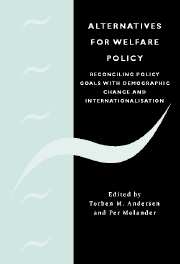Book contents
- Frontmatter
- Contents
- List of contributors
- Preface
- 1 Introduction
- 2 International integration and the welfare state
- 3 The changing age structure and the public sector
- 4 Emigration from the Scandinavian welfare states
- 5 Productivity and costs in public production of services
- 6 Use of fees in the provision of public services in OECD countries
- 7 Privatisation of social insurance with reference to Sweden
- 8 Occupational welfare
- 9 Pathways to retirement and retirement incentives in Sweden
- 10 Social insurance and redistribution
- 11 Assessing the effect of introducing welfare accounts in Sweden
- 12 Taxation in a global economy
- 13 Taxation and education investment in the tertiary sector
- 14 Debt strategies for Sweden and Europe
- 15 Policy options for reforming the welfare state
- Index
- References
15 - Policy options for reforming the welfare state
Published online by Cambridge University Press: 22 September 2009
- Frontmatter
- Contents
- List of contributors
- Preface
- 1 Introduction
- 2 International integration and the welfare state
- 3 The changing age structure and the public sector
- 4 Emigration from the Scandinavian welfare states
- 5 Productivity and costs in public production of services
- 6 Use of fees in the provision of public services in OECD countries
- 7 Privatisation of social insurance with reference to Sweden
- 8 Occupational welfare
- 9 Pathways to retirement and retirement incentives in Sweden
- 10 Social insurance and redistribution
- 11 Assessing the effect of introducing welfare accounts in Sweden
- 12 Taxation in a global economy
- 13 Taxation and education investment in the tertiary sector
- 14 Debt strategies for Sweden and Europe
- 15 Policy options for reforming the welfare state
- Index
- References
Summary
Time for policy reform
The unifying theme of this volume is whether basic objectives of the extended welfare state found in the Scandinavian countries can be met in a more efficient way at the same time as it is adapted to address important challenges including internationalisation and demographic shifts. A satisfactory discussion of this question requires both a detailed account of the changes in the environment as well as a careful consideration of both the expenditure and revenue sides of the public sector. The chapters in this volume have addressed various important items on this agenda. Without claiming a fully exhaustive coverage of all topics, it is worthwhile to take stock of the various analyses in an attempt to identify possible reform options. In our view the welfare state is not in an immediate crisis requiring sudden abrupt policy reforms, but we find that the problems and challenges are important enough to call for serious consideration of policy changes. The main reasons are that some of the changes needed will attain their full effect only after a considerable timespan, and that some changes also need to be announced well in advance to have the desired effects. To be specific, we think in terms of a time perspective of about three decades. Still, this implies that the timespan for initiation of policy reforms is short, if policies are to address the problems in an appropriate way that also ensures that the future policy path is transparent and stable.
- Type
- Chapter
- Information
- Alternatives for Welfare PolicyCoping with Internationalisation and Demographic Change, pp. 350 - 375Publisher: Cambridge University PressPrint publication year: 2003
References
- 1
- Cited by



